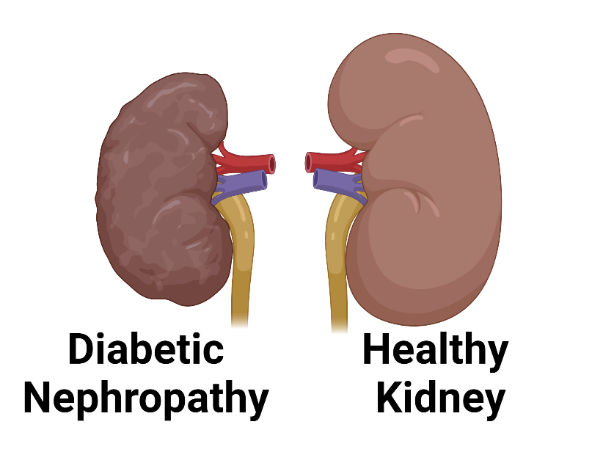Diabetic Kidney Care

Diabetic nephropathy is the name given to kidney damage caused by diabetes. It develops slowly, over many years, and is also referred to as kidney disease.
Almost one in five people with diabetes will need treatment for diabetic nephropathy. This may be a worrying statistic, but there’s a lot you can do to reduce your risk of developing the complication. If spotted early enough, diabetic nephropathy can also be slowed down with treatment.
What causes kidney disease?
One of the main jobs of your kidneys is to filter your blood. They get rid of extra fluid and waste products from your body through your urine.
High blood glucose (sugar) levels can damage the small blood vessels and tiny filters in your kidneys. High blood pressure can also do this too. This can cause them to leak and not work as well. When this happens, abnormal amounts of protein from the blood can leave your body in your urine. This is often an early sign of kidney disease.
Symptoms of kidney disease
You may not have visible symptoms in the early stages of kidney disease. This is why it's so important to have the tests for kidney disease every year, as it can be spotted early and slowed down with treatment. If kidney disease progresses, you could notice symptoms like:
- swollen ankles, feet and hands
- blood in your pee (urine)
- feeling really tired
- being short of breath
- feeling sick.
You may be feeling like this because your kidneys are struggling to clear extra fluid and waste from your body. But these symptoms can also be caused by other conditions, so it’s important to talk to your doctor for more information and advice.
Treating kidney disease
The type of treatment you need will depend on the stage of kidney disease.
It’s very important to keep your blood pressure under control to stop kidney disease from getting worse. You may be given tablets, such as ACE inhibitors or ARBs, to help with this.
Both ACE inhibitors and ARBs help to protect the kidneys from further damage, as well as lower blood pressure. That’s why they are also made available to people without high blood pressure.
You may also get advice to avoid certain foods, but you’ll need to get support from a registered dietitian to help you with the changes to your diet.
If you do develop late-stage kidney disease and your kidneys fail, your treatment options include dialysis or a kidney transplant. The good news is, as treatments and early diagnosis continues to improve, fewer people will go on to develop late-stage kidney disease.